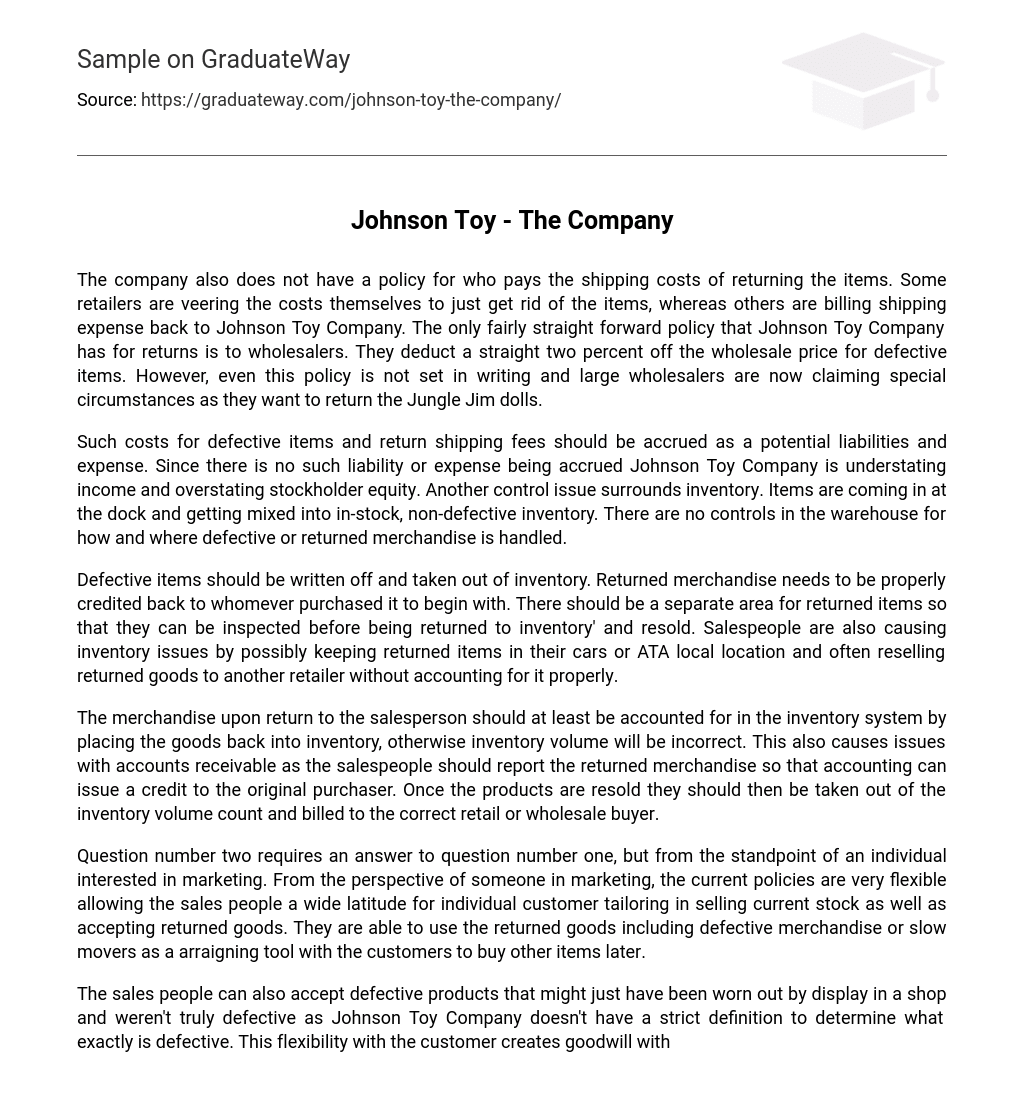The company also does not have a policy for who pays the shipping costs of returning the items. Some retailers are veering the costs themselves to just get rid of the items, whereas others are billing shipping expense back to Johnson Toy Company. The only fairly straight forward policy that Johnson Toy Company has for returns is to wholesalers. They deduct a straight two percent off the wholesale price for defective items. However, even this policy is not set in writing and large wholesalers are now claiming special circumstances as they want to return the Jungle Jim dolls.
Such costs for defective items and return shipping fees should be accrued as a potential liabilities and expense. Since there is no such liability or expense being accrued Johnson Toy Company is understating income and overstating stockholder equity. Another control issue surrounds inventory. Items are coming in at the dock and getting mixed into in-stock, non-defective inventory. There are no controls in the warehouse for how and where defective or returned merchandise is handled.
Defective items should be written off and taken out of inventory. Returned merchandise needs to be properly credited back to whomever purchased it to begin with. There should be a separate area for returned items so that they can be inspected before being returned to inventory’ and resold. Salespeople are also causing inventory issues by possibly keeping returned items in their cars or ATA local location and often reselling returned goods to another retailer without accounting for it properly.
The merchandise upon return to the salesperson should at least be accounted for in the inventory system by placing the goods back into inventory, otherwise inventory volume will be incorrect. This also causes issues with accounts receivable as the salespeople should report the returned merchandise so that accounting can issue a credit to the original purchaser. Once the products are resold they should then be taken out of the inventory volume count and billed to the correct retail or wholesale buyer.
Question number two requires an answer to question number one, but from the standpoint of an individual interested in marketing. From the perspective of someone in marketing, the current policies are very flexible allowing the sales people a wide latitude for individual customer tailoring in selling current stock as well as accepting returned goods. They are able to use the returned goods including defective merchandise or slow movers as a arraigning tool with the customers to buy other items later.
The sales people can also accept defective products that might just have been worn out by display in a shop and weren’t truly defective as Johnson Toy Company doesn’t have a strict definition to determine what exactly is defective. This flexibility with the customer creates goodwill with the sales people and thus Johnson Toy Company. Ideally the customers will be happy with the sales people’s flexibility, order more products from the sale person, and thus generate more revenue for Johnson Toy Company. The lack of controls and polices surrounding sales and returns can also create marketing issues for the sales people.
If inventory is not accurate, say they have a higher than expected volume of one product, then sales people will have a hard time knowing which products they need to push to the customers. Conversely if a store orders a large shipment of another product, but inventory is depleted and it cannot be sent to the customer, then this reflects badly on the sales person and might anger the customer. If inventory levels are not known, or not correct, sales people will have a official time knowing which products they can and cannot market to the retailers and wholesalers.
Often a sales persons’ income is linked to product sales via a commission as a percentage of dollar value of sales revenue. If items returned are deducted from the amount of commission, this would be a disadvantage for the sales person and thus they might be inclined to hide the returns and commit fraud. However, if they are able to get a higher price for that returned item from another customer, it would benefit the sales person to have accounting properly credit the original customer and bill the second customer so that hey receive a higher commission for that product.
It would also benefit the marketing and sales teams to know which customer is purchasing what type of products, when they are purchasing them, and how much they purchase so that they will know which future type of products the customer is inclined to buy. This information also is valuable to try to market sister type products (accessories, etc) to the stores. Question number three says to propose a policy for handling returns that should be adopted by the Johnson Toy Company and to be certain to list resistances under which exceptions would be allowed as well as if it should be applied to the Jungle Jim dolls.
The policy should address items that are defective returns verses new returns. The policy should also have separate verbiage for wholesalers and retailers. Wholesalers usually buy in bulk and are often given discounts for the large volumes that they purchase. The policy should be as follows: I. A defective item is defined as an item made incorrectly at the factory. This does not include items that are shop worn – scratched, dented and damaged while in the retailers hand. II. Defective items are the responsibility fashion Toy Company.
Standard policy will be to accept all items deemed faulty due to manufacturing. Dam Ill. Standard (non- defective) returns must be in their original unused condition to be returned. Items are subject to a 10% restocking fee, this will be deducted from your refund. We also do not refund the original shipping and handling that you paid on the order, nor will we refund shipping to send the items back to us. IV. All returned items will be issued refunds as a merchandise credit to the original buyer of the products.





